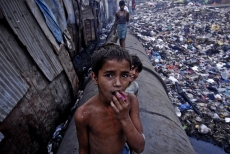The CPD Blog is intended to stimulate dialog among scholars and practitioners from around the world in the public diplomacy sphere. The opinions represented here are the authors' own and do not necessarily reflect CPD's views. For blogger guidelines, click here.
MUMBAI -- Following the attacks here two weeks ago, much of the coverage on local media looks familiar: red banner stripes and logos with such phrases as "26/11 Fight against Terrorism". But it is not quite the same as US networks' "War on Terror".
There are "Indians of the Year", mini-package profiles of the soldiers and others who died during the fighting that occurred the week before last just down the street from my hotel, and live coverage of vigils and demonstrations. Also, the attack on Mumbai has been framed as attack on modernity. So far, again, it looks quite familiar.

In the new movie "Slumdog Millionaire" there is a poignant scene that all public diplomacy experts should have etched in their minds. It's of a classroom full of boys in a Mumbai slum inhabited by Moslems passing around one copy of the "Three Musketeers" as part of their English lesson. Later we watch one of those boys evolve into a gangster. He could just as easily have joined Al Qaeda. The scene takes place in the early 1980's, but I suspect that in spite of India's growth that similar scenes can be found today.
When USC’s Center on Public Diplomacy embarked on its Virtual Worlds project a few years ago, I admit to being somewhat sceptical. The undertaking seemed, at the time, just too ephemeral, too abstract, too distant from the machinations of realpolitik and the grind of bureaucratic process which I experienced daily as a diplomat.
My thinking, not unlike internet applications, has since migrated.
With help from USC’s Center on Public Diplomacy and hundreds of other individuals and groups, I recently authored a Brookings Institution report on public diplomacy and what it should look like in the coming years and decades. That report is available on-line at Voices of America: U.S.... >
Much that is written about public diplomacy focuses on Europe and the Muslim world. National news media in the US, headquartered in New York and Washington, equates foreign opinion with approving editorials in The Guardian and large crowds in Berlin. By those criteria, President-elect Barack Obama is wildly popular. Just elect Obama, the thinking goes, and America's public diplomacy problems are solved.
Not quite: The data indicate Obama was never as popular in Asia as in Europe. And it turns out President Bush was never as unpopular in Asia as he was in Europe.
Given that President Bush told journalists this summer that Pakistan will be the next American president's biggest foreign policy challenge, let's take a moment to consider the public-diplomacy issues for both sides now that the U.S. has a new President-elect.
It may be peculiar to comment on one’s own blog. But, having just provided a post on possible directions for Obama’s international broadcasting and public diplomacy strategy, I realized I had missed the elephant (or donkey) in the room.
Pages
Visit CPD's Online Library
Explore CPD's vast online database featuring the latest books, articles, speeches and information on international organizations dedicated to public diplomacy.
POPULAR ARTICLES
-
March 22
-
April 11
-
April 1
-
March 4
-
March 19
Featured Blogger
Join the Conversation
Interested in contributing to the CPD Blog? We welcome your posts. Read our guidelines and find out how you can submit blogs and photo essays >.








